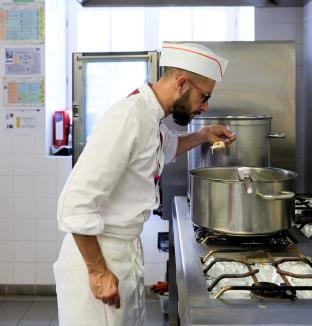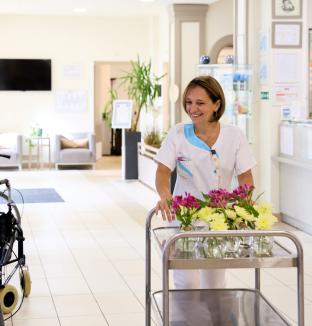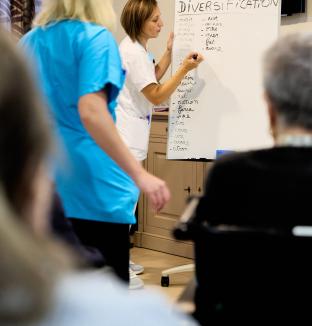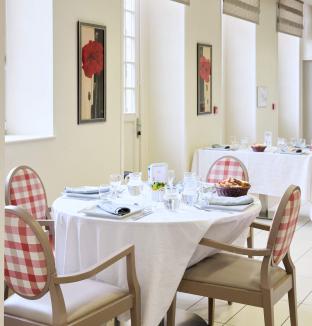Food for body and mind
In emeis facilities, nutrition is an integral part of care. Designed to promote and accelerate rehabilitation, whether physical or mental, it is part of a comprehensive and caring approach. Meet Isabelle Piriou, head of clinical nutrition, who defends a therapeutic and human vision of nutrition.
When nutrition becomes a pillar of rehabilitation
Rehabilitating patients involves more than medical care. At emeis, looking after the contents of each plate is an integral part of the therapeutic process: "Nutrition cannot be dissociated from rehabilitation. It is a treatment in its own right and a vector for public health, both physical and mental", says Isabelle Piriou.
This vision is put into practice in the kitchens of emeis establishments: menus are drawn up in accordance with the recommendations of the French National Nutrition and Health Programme and the GEMRCN[1] , then adjusted to the specific needs of patients, in consultation with dieticians, carers and chefs.

Nutrition, the first step towards recovery
After physical effort, an injury or an operation, the body enters a regeneration phase. This is largely dependent on an appropriate diet. At emeis, our nutritional protocols are designed to encourage:
- Muscle fibre repair, thanks to a targeted protein intake, combined with vitamins, minerals and essential fatty acids.
- Reducing inflammation by eating a diet rich in antioxidants, including vitamin C, E, zinc and selenium.
- Replenish energy reserves by ensuring a good balance between complex carbohydrates and high-quality fats.
Depending on the patient's profile, certain proteins are particularly recommended:
- Collagen, which is widely used by athletes and young patients undergoing rehabilitation, improves the flexibility and strength of tendons, muscles and ligaments.
- Whey and casein, favoured by the elderly who are often malnourished, help rebuild muscles and prevent falls.

A mirror effect on mental health
At emeis, we pay particular attention to the link between the intestine and the brain. This is reflected in the food we eat: our menus contain probiotics, reputed to promote healthy digestion and better emotional balance.
The nutritional approach is also intended to be caring and guilt-free. "In a context of psychological fragility, the pleasure of eating plays an important role. Allowing a piece of chocolate means recognising this need for comfort, without judgement. This small gesture can soothe, restore motivation and sometimes even help people to rediscover the pleasure of eating," explains Isabelle Piriou.
To support cognitive functions, which are often compromised during care, the teams are also careful to offer foods rich in omega-3s, B vitamins and magnesium, such as oily fish, pulses and nuts

Measurable results, a lasting vision
The effects of good nutrition are visible: some obese patients have lost weight for the first time, malnourished patients have improved blood tests, and patients undergoing post-operative care are able to heal more quickly. "In our clinics, food is an active therapeutic tool; in our retirement homes, it is more a moment of pleasure and childhood memories with traditional dishes," emphasises Isabelle Piriou.
In addition to the meals served, emeis offers a genuine food learning programme. Therapeutic cooking workshops, guidance in supermarket aisles and advice on labelling help patients to take control of their diet.
Diet is not just a one-off therapeutic tool: it is part of a long-term approach. The aim is to support patients well beyond the treatment period, by giving them the keys to maintaining a balanced and appropriate diet once they return home. This involves nutritional education and raising awareness of the right things to do, as well as a broader reflection on our consumption patterns. "The future of nutrition lies not only in education from an early age, but also in more responsible and sustainable consumption," explains Isabelle Piriou.

The word of a chef in Haute-Garonne
At the clinic in Lagardelle-sur-Lèze (31), chef Jean-Michel Bouchez is convinced: "Meals are as much a part of therapy as treatment".
Every day, his team cooks on the premises using fresh produce, with the constant aim of combining nutritional quality and taste pleasure. His commitment is bearing fruit. The chef remembers a cancer patient who was touched to have finally rediscovered the desire to eat after several disappointing establishments: "It's the first place where I've eaten well," she told him, after gaining weight and regaining her spirits.
To stimulate the appetite and promote well-being, the clinic has also created a warm and inviting area known as "the village plazza". Tablecloths, murals, string lights: everything has been designed to create a friendly atmosphere. The dishes are carefully prepared and presented, and meals are shared in a setting that breaks away from the traditional hospital atmosphere.
As you'll have realised, eating is vital, but eating well can change everything when you're convalescing or frail. On a daily basis, our chefs develop recipes adapted to the needs, diets... but also the tastes of our patients, for moments of pleasure that do us good!

[1] Contract catering and nutrition research group
